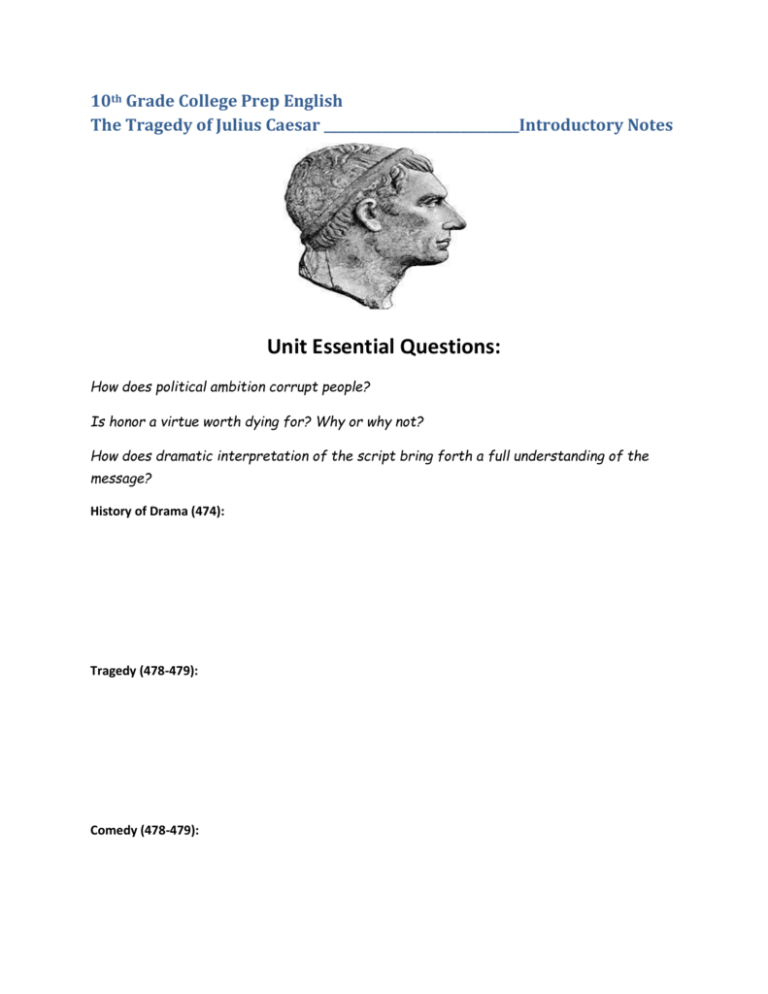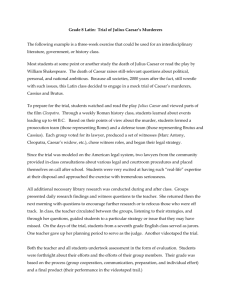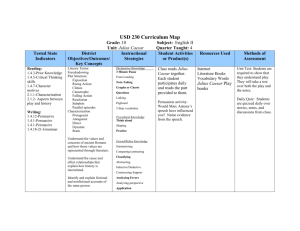The Tragedy of Julius Caesar (535)
advertisement

10th Grade College Prep English The Tragedy of Julius Caesar ______________________________Introductory Notes Unit Essential Questions: How does political ambition corrupt people? Is honor a virtue worth dying for? Why or why not? How does dramatic interpretation of the script bring forth a full understanding of the message? History of Drama (474): Tragedy (478-479): Comedy (478-479): Guideline for Close Reading (480-481): 1. 2. 3. 4. 5. The Tragedy of Julius Caesar (535): Source Information: (535) o Five-Act Structure o William Shakespeare o Birth Date and Death Date o Stratford on Avon o Shakespeare’s Childhood o Education o Anne Hathaway o Acting Career o Lord Chamberlain’s Men o The Globe o Queen Elizabeth I o Renaissance o Shakespeare’s Retirement Key Drama Terms: o Stage o Stage doors o Trap door o Galleries o The Heavens o Hut o Dressing Rooms o Tiring-house o The yard o Lords’ Room o Gentlemen’s Rooms o Groundlings o Drama o Act o Scene o Soliloquy o Pun o Personification o Simile o Tragic Hero o Stoic o Triumvirate The Life of Caesar by Plutarch- pg. 290 Adventures in Appreciation Name:_______________________________________________Date:__________________________ 1. What facts does Plutarch provide about the Roman governmental system during Caesar’s rule and about the previous system? 2. Describe both Caesar’s good and bad qualities as a ruler—these examples must come from the selection. 3. Identify at least three details in Plutarch’s account demonstrating that many Romans of Caesar’s time believed supernatural forces intervened directly in human affairs. 4. Brutus’ internal conflict adds interest and drama to the narrative. Describe this conflict. 5. Plutarch describes Caesar’s character directly but also develops it indirectly—for example, through the ways other people approach and react to him. What are Decimus Brutus’ persuasive arguments to Caesar, and how do they reveal Caesar’s character? 10th Grade College Prep English The Tragedy of Julius Caesar____________Intro to Characters, Themes, and Setting Themes: Setting: Triumvirs after the death of Julius Caesar: Octavius, Marcus Atonius, M. Aemilius Lepidus Senators: Cicero, Publius, Popilius Lena Conspirators against Julius Caesar: Marcus Brutus, Cassius, Casca, Trebonius, Ligarius, Decius Brutus, Metellus Cimber, Cinna Friends of Brutus and Cassius: Lucilius, Titinius, Messala, Young Cato, Volumnius Servants of Brutus: Varro, Clitus, Claudius, Strato, Lucius, Dardanius, Pindarus





